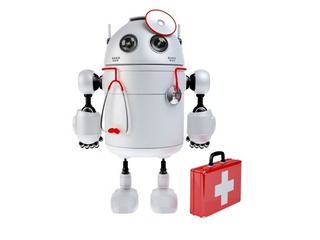Omair Ansari, CEO of Abhi, on the Vator Innovation Podcast
Abhi provides working capital to SMEs and earned wage access to employees
Read more... While healthcare has a reputation as a space that moves slowly (and for good reason), there have been some pretty big things happening lately, including the move to value-based care and the rise of digital health, which is putting more control of health into the hands of patients.
While healthcare has a reputation as a space that moves slowly (and for good reason), there have been some pretty big things happening lately, including the move to value-based care and the rise of digital health, which is putting more control of health into the hands of patients.
One of the most exciting trends since the beginning of last year has been the move toward teletherapy: with $2.4 billion invested, 2020 was a record year for digital behavioral health companies. And 2021 has shown no signs of slowing down, with companies like SonderMind and Lyra Health raising big funding rounds.
The other big trend in healthcare, though one that's not exactly new anymore, has been the use of artificial intelligence and chatbots to take some of the burden off the healthcare system, particularly physicians who are experiencing major burnout. How important is AI becoming in healthcare? It's set to grow to over $120 billion by 2028.
Woebot Health combines these two things into a single platform: it's created an AI-powered mental health chatbot that uses proven therapeutic techniques to help its bot bond with patients. In fact, Woebot says that can happen in as quickly as three days, faster than the two to six weeks it for a patient to bond to a human therapist.
Last week, the company announced a $90 million Series B funding round co-led by existing investor JAZZ Venture Partners and Temasek, with participation from funds and accounts managed by BlackRock Private Equity Partners and Owl Ventures. Mirae Asset Capital, Kicker Ventures, Alumni Ventures and Gaingels, as well as existing investors NEA and AI Fund, also participated, bringing the company's total raised to $114 million.
On the heels of that fundraise, Woebot Health CEO Michael Evers spoke to VatorNews about his company, the effect of COVID on mental health, the benefits of using AI, and what's next for Woebot.
VatorNews: What problems do you see currently plaguing the mental health space, especially over the last 18 months?
Michael Evers: Mental health is a human and economic crisis. Today, our supply of mental health professionals can’t keep up with demand. Most solutions aren’t built to truly engage with users, and with tens of thousands of wellness apps available, proof of outcomes is limited. We believe that proven cognitive and behavioral therapies are great, but are limited because of the way they are typically delivered. We also believe in the power of relational technology to engage people in their mental health across a lifetime, and to do that for millions simultaneously.
Humans aren’t scalable, but technology is, and our technology has demonstrated that it can form a bond with humans. This is a significant step forward in addressing the capacity problem we have always faced due to a scarcity of trained human professionals.
VN: How does Woebot Health solve those problems? What is your solution?
ME: We are a digital therapeutics company that is transforming mental health care through human-centric technology, making care more accessible, scalable and personal. We’ve built the first AI-driven platform that leverages proven clinical and relational strategies to allow people to establish a human-level bond with our solutions and to be more receptive and responsive to digitally-delivered mental health care.
VN: Who is the typical customer for Woebot? Walk me through some typical use cases.
ME: Woebot is available on app stores and has been downloaded by people who need an instantly accessible, stigma free “personal coach” to help them work through life’s ups and downs. We are deploying behavioral health offerings with payer and provider networks as well as other consumer health companies, and pursuing a regulatory pathway for digital therapeutics for postpartum and adolescent depression, all of which is geared to realizing our goal to provide broad and scalable access to mental health solutions and to supporting our commercial strategy to address unmet needs across the care continuum.
VN: How does your AI work? Are you using it to diagnose patients and, if so, how accurate is it?
ME: Woebot works by inviting people to have a conversation. In fact, the Woebot experience is just that: a simulated supportive conversation that encourages authentic disclosure and makes therapy radically accessible. Woebot uses AI and Natural Language Processing (NLP) techniques to learn from millions of conversations annually and to provide therapeutic encounters that are psychologically related, responsive to a person’s dynamic state of health, and targeted using tools from cognitive, behavioral, and interpersonal disciplines.
The term “AI” is broad and alone doesn’t fully describe the Woebot Health approach. For the most part, what Woebot says is actually scripted based on proven therapeutic techniques. We’ve thoughtfully integrated AI in specific areas, for example in detecting high risk language and understanding the nature of the problem that people are coming to Woebot to talk about. We want to make sure our AI algorithms help us advance the personalized and responsive nature of Woebot, and help us constantly learn and improve Woebot’s understanding of free text.
Woebot has the ability to deploy common assessment frameworks but does not offer diagnoses. That said, diagnosed patients referred by a clinician do use Woebot.
VN: Is there a human involved in any way? For example, if someone's problems escalate and they seem to be in danger of harming themselves, or others, how does the platform handle that?
ME: Woebot is a purely digital solution because we’re delivering a scalable solution that can help solve for gaps in care. In the U.S. alone, there are tens of millions of people living with depression and anxiety, and only 150,000 clinicians available to see them. We’re well past the point where the only solution in sight is a 1:1 in person visit with a human. We need to find innovative ways to meet the vast unmet need, safely and effectively. We designed Woebot to function as an effective gateway to mental health support, a reinforcement to human-delivered treatment, or as an approachable and accessible option for those who may otherwise avoid or cannot access in-person treatment.
In regards to escalation, Woebot uses AI to process what patients type into their texts, and detects suicidal ideation and other crisis language with 98.9% accuracy. If Woebot detects anything that might be of clinical concern, it provides a list of crisis intervention resources curated by our clinicians and other outside experts that enable them to speak to a human.
VN: What kind of ROI have you been able to calculate for patients thanks to your platform? Do you have hard numbers you can share?
ME: Woebot’s relational technology was built to engage, and we see the beneficial results of that very specific design strategy in our customer implementations and in our clinical studies. We can’t disclose our customers or their results, but I can say that to date our clients have seen results equal to our published clinical studies, including our first study which showed that using Woebot led to significant reductions in anxiety and depression among people aged 18-28 years old in just two weeks. We think relational technologies are the secret to unlocking the potential of digital therapeutics like never before, and we look forward to collaborating with others in our industry to advance the next frontier of technology-enabled mental health care.
VN: How many users do you have now? How is that number growing?
ME: We don’t disclose user numbers but can say that Woebot exchanges millions of messages with users every week, upwards of 500 million messages to date, and that we’ve seen a surge of interest during and post pandemic.
VN: What is the cost to users? Who pays for Woebot?
ME: We are pursuing several payment models, including reimbursement from PDTs, licensing, and value-based payments from behavioral health offerings. Our app store offerings are currently free; we intend to continue to find ways to provide broad access to various populations seeking help. That may involve key distribution collaborations or other channels and will evolve as we learn what works for users and for our business.
VN: How was Woebot affected by COVID? Did you see accelerated adoption or engagement?
ME: Engagement has always been high because of the way Woebot was designed, but we have seen significantly greater interest in our products and business over the last 18 months.
VN: Did you release any additional features to accommodate patients during the pandemic?
ME: We delivered the first fully built-out program of specially crafted coronavirus content in early 2020. Called “Perspectives,” it contained content designed to inspire hope and encourage perspective taking, as well as Woebot’s hallmark guided meditations and strategies for dealing with grief, stress, and sadness. It is still being used today.
VN: How have you seen the healthtech space evolve in recent years? What is your vision for where it’s going and how will Woebot Health help it get there?
ME: We see great potential for relational technologies to deeply engage people in their mental health at scale, and to transform care. We’re committed to advancing the next frontier of technology-enabled mental health care. Our proprietary relational agent, Woebot, is the only AI-driven mental health solution proven to establish a bond with users that is on par with the bond formed through human interaction. Being entirely AI-driven, yet able to create human-level bond with users, uniquely positions Woebot to provide effective mental health care on-demand, and at-scale.
VN: What is your ultimate goal with Woebot Health? What will success look like for you?
ME: Our mission is to make mental health radically accessible. Success is when everyone has access to the mental health tools they need, in the moment, and our system of delivering mental health care is transformed.
VN: Is there anything else I should know about the company or the new funding round?
ME: Digital therapeutics can bring important nuance to the mental health conversation by suggesting that there is a more expansive, holistic way to provide mental health care than relying solely on in-person therapy.
(Image source: woebothealth.com)
Abhi provides working capital to SMEs and earned wage access to employees
Read more...Northstar democratizes wealth management for employees
Read more...Murad was appointed last week, succeeding founding CEO Stephanie Tilenius
Read more...

